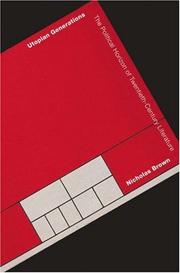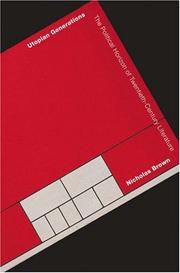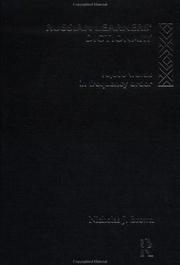| Listing 1 - 10 of 24 | << page >> |
Sort by
|

ISBN: 0691122121 0691122113 9786612087295 1282087290 1400826837 9781400826834 9780691122113 9780691122120 Year: 2005 Volume: *2 Publisher: Princeton ; Oxford Princeton University Press
Abstract | Keywords | Export | Availability | Bookmark
 Loading...
Loading...Choose an application
- Reference Manager
- EndNote
- RefWorks (Direct export to RefWorks)
Utopian Generations develops a powerful interpretive matrix for understanding world literature--one that renders modernism and postcolonial African literature comprehensible in a single framework, within which neither will ever look the same. African literature has commonly been seen as representationally naïve vis-à-vis modernism, and canonical modernism as reactionary vis-à-vis postcolonial literature. What brings these two bodies of work together, argues Nicholas Brown, is their disposition toward Utopia or "the horizon of a radical reconfiguration of social relations.? Grounded in a profound rethinking of the Hegelian Marxist tradition, this fluently written book takes as its point of departure the partial displacement during the twentieth century of capitalism's "internal limit" (classically conceived as the conflict between labor and capital) onto a geographic division of labor and wealth. Dispensing with whole genres of commonplace contemporary pieties, Brown examines works from both sides of this division to create a dialectical mapping of different modes of Utopian aesthetic practice. The theory of world literature developed in the introduction grounds the subtle and powerful readings at the heart of the book--focusing on works by James Joyce, Cheikh Hamidou Kane, Ford Madox Ford, Chinua Achebe, Wyndham Lewis, Ngugi wa Thiong'o, and Pepetela. A final chapter, arguing that this literary dialectic has reached a point of exhaustion, suggests that a radically reconceived notion of musical practice may be required to discern the Utopian desire immanent in the products of contemporary culture.
English literature --- Politics and literature --- African literature --- Comparative literature --- Modernism (Literature) --- Politics in literature. --- Utopias in literature. --- History and criticism. --- History --- English and African. --- African and English. --- Utopian literature --- Political science in literature --- Crepuscolarismo --- Literature, Comparative --- Literature --- Literature and politics --- History and criticism --- Political aspects --- Literary movements --- Postmodernism (Literature) --- Philology
Book
ISBN: 1316143805 1316144135 1316144178 1316144275 1316143740 1316143767 1316143848 1316143783 113919626X 1107015731 110764609X 9781316143780 9781139196260 9781107646094 9781107015739 9781107646094 Year: 2014 Publisher: Cambridge : Cambridge University Press,
Abstract | Keywords | Export | Availability | Bookmark
 Loading...
Loading...Choose an application
- Reference Manager
- EndNote
- RefWorks (Direct export to RefWorks)
Designed as an 'ideal city' and emblem of the nation, Canberra has long been a source of ambivalence for many Australians. In this charming and concise book, Nicholas Brown challenges these ideas and looks beyond the clichés to illuminate the unique, layered and often colourful history of Australia's capital. Brown covers Canberra's selection as the site of the national capital, the turbulent path of Walter Burley Griffin's plan for the city and the many phases of its construction. He surveys citizens' diverse experiences of the city, the impact of the Second World War on Canberra's growth and explores the city's political history with insight and wit. A History of Canberra is informed by the interplay of three themes central to Canberra's identity: government, community and environment. Canberra's distinctive social and cultural history as a centre for the public service and national institutions is vividly rendered.
Book
ISBN: 9781478001591 Year: 2019 Publisher: Durham : Duke University Press,
Abstract | Keywords | Export | Availability | Bookmark
 Loading...
Loading...Choose an application
- Reference Manager
- EndNote
- RefWorks (Direct export to RefWorks)
Art and business --- Art and business. --- Art and society --- Art and society. --- Art, Modern --- Arts --- Autonomie. --- Kapitalismus. --- Kritische Theorie. --- Kunst. --- Kunstmarkt. --- History --- Economic aspects --- Economic aspects. --- Political aspects.
Digital
ISBN: 9781139196260 Year: 2014 Publisher: Cambridge Cambridge University Press
Abstract | Keywords | Export | Availability | Bookmark
 Loading...
Loading...Choose an application
- Reference Manager
- EndNote
- RefWorks (Direct export to RefWorks)

ISBN: 9781400826834 9780691122120 Year: 2009 Publisher: Princeton, N.J. Princeton University Press
Abstract | Keywords | Export | Availability | Bookmark
 Loading...
Loading...Choose an application
- Reference Manager
- EndNote
- RefWorks (Direct export to RefWorks)

ISBN: 0415137918 0415137926 Year: 1996 Publisher: London : Routledge,
Abstract | Keywords | Export | Availability | Bookmark
 Loading...
Loading...Choose an application
- Reference Manager
- EndNote
- RefWorks (Direct export to RefWorks)
Russian language --- Russe (Langue) --- Dictionaries --- English --- Word frequency --- Dictionnaires anglais --- Fréquence des mots --- Dictionnaires --- Engelse taal --- Russische taal --- English. --- Dictionaries. --- woordenboeken --- basiswoordenschat --- frequentielijsten --- frequentiewoordenboeken --- woordfrequentie --- woordenboeken. --- frequentielijsten. --- frequentiewoordenboeken. --- woordfrequentie. --- Fréquence des mots
Book
ISBN: 9780776617725 0776617729 9780776606545 0776606549 1280690755 9786613667694 9780776618555 0776618555 Year: 2007 Volume: *1 Publisher: Ottawa : University of Ottawa Press,
Abstract | Keywords | Export | Availability | Bookmark
 Loading...
Loading...Choose an application
- Reference Manager
- EndNote
- RefWorks (Direct export to RefWorks)
Australia, Canada, and Ireland are all engaged in questions of multiculturalism and in the politics of recognition and reconciliation, the opportunities and pressures of geographic regionalism, shifts in political agendas associated with the impact of neo-liberalism, and moves to frame political agendas less at the macro-level of state intervention and more at the level of community partnership and empowerment. In related but distinct ways, each state is being challenged to devise policies and offer outcomes that address an unfolding and unsteady synthesis of issues relating to citizen
Citizenship -- Congresses. --- Multiculturalism -- Australia -- Congresses. --- Multiculturalism -- Canada -- Congresses. --- Multiculturalism -- Ireland -- Congresses. --- Citoyennete --- Multiculturalisme --- Citizenship --- Multiculturalism --- Cultural diversity policy --- Cultural pluralism --- Cultural pluralism policy --- Ethnic diversity policy --- Social policy --- Anti-racism --- Ethnicity --- Cultural fusion --- Government policy --- History --- Diversity --- Public Policy --- Sociology --- Australia --- Canada --- Ireland --- Jus soli --- Quebec
Book
ISBN: 0847693880 0847693899 Year: 2000 Publisher: Lanham, Md Rowman & Littlefield
Abstract | Keywords | Export | Availability | Bookmark
 Loading...
Loading...Choose an application
- Reference Manager
- EndNote
- RefWorks (Direct export to RefWorks)
Book
Year: 1901 Publisher: London Linnean Society of London
Abstract | Keywords | Export | Availability | Bookmark
 Loading...
Loading...Choose an application
- Reference Manager
- EndNote
- RefWorks (Direct export to RefWorks)
Book
ISBN: 1478001240 1478001593 1478002670 Year: 2019 Publisher: Duke University Press
Abstract | Keywords | Export | Availability | Bookmark
 Loading...
Loading...Choose an application
- Reference Manager
- EndNote
- RefWorks (Direct export to RefWorks)
| Listing 1 - 10 of 24 | << page >> |
Sort by
|

 Search
Search Feedback
Feedback About UniCat
About UniCat  Help
Help News
News